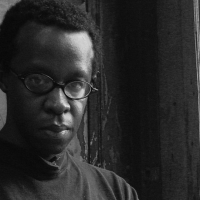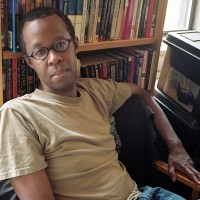On January 27, 2107 Piano Song will become the second release by the Newman Taylor-Baker/Michael Bisio lineup of the Matthew Shipp Trio. But it also marks the last in a long line of greatness, as Shipp’s eighteen year run with the Thirsty Ear label as a recording artist comes to an end with this album. One of jazz’s most innovative piano stylists of the last thirty years, Shipp has recorded for other labels during this time and will continue to do so, but leaves behind a breathtaking array of albums: from Pastoral Composure in a trio with William Parker; to solo piano outings like Piano Sutras; to audacious, hip-hop/avant jazz experiments such as Nu-Bop. The common denominator through all his Thirsty Ear releases is his refusal to back down from challenging listeners to accept his music with fresh ears and an open mind. And once anyone does that, the rewards never stop coming to them.
The challenges and rewards continue right up to the end. Shipp has delivered his last twelve songs for Thirsty Ear with the same vigor and commitment as a first audition, but with the collected confidence of an established vet. A dedicated follower of Shipp will know about the elements of his signature styles but cannot predict how Shipp puts those elements together, and that alone is why Piano Song isn’t going to be The Conduct of Jazz, Part 2.
On the newer record, Shipp begins with a gently introspective piano soliloquy, “Links” and follows up with the full band on the freely swinging “Cosmopolitan,” where that swing doesn’t go away even when everyone stops for Bisio’s unaccompanied solo bass turn and later on, Baker’s drum feature.
Continuing the contrasts and contradictions, dark, diffused moods pervade with “Blue Desert,” starting with the shakes from Baker that resemble the ominous ticking of a grandfather clock. “Silence of” is a communion of sinuous harmony and rhythm. What’s most remarkable about this performance is that the three share the load carrying out the rhythm equally instead of relying solely on Baker for that task. Yet, the melodic development is also done democratically.
“Flying Carpet” is the first ‘groove’ number of this batch of tracks, Shipp placing his notes in the intervals and making every chord impactful. The momentum alters along the way, going free and returning to the original motifs more subdued than before building up and releasing again. “Scrambled Brain” is a Bisio showcase, and like the pianist, Bisio is a bassist who’s able to blur the lines between melody and improvisation while showing off elite chops as he does for this song. In the meantime, Baker is locked in to his every, unpredictable move and eventually, Bisio gives way to him as he exploits nearly the full timbre palette of his drums.
“Micro Wave” finds Shipp engaging in Monk-isms that at this point of his career have transformed into ‘Shipp-isms’, marked by series of repeated quips surrounded by graceful lines punctuated with bold, jarring block chords. As the name suggests, “Void of” leaves gaping voids between notes, while “The Nature of” is much about eliminating the voids. By the time we reach “Gravity Point,” the sonic cup is overflowing again, and Shipp has tipped over strongly onto the Cecil Taylor side of freedom.
Finally, “Piano Song” is pure emotion and Shipp can wring that from a piano as effortlessly as the best of them. Occasionally, Bisio’s yawning bass can be heard, a slight touch that augments the affection generated so beautifully by Shipp.
Thirsty Ear has become an indispensable record company for adventurous music, primarily in the jazz field. It’s become that way largely because of one Matthew Shipp, who will continue to serve the label as artistic director of its Blue Series line of records focusing on avant-garde jazz, electronic and hip-hop. That will insure that the Blue Series will continue to earn the high esteem it’s enjoyed within the jazz community. In the meantime, Piano Song leaves one last example of the high standard set by its A&R guy for other artists to strive toward.
- Claudio Scolari Project – ‘Bloom’ (2025) - June 12, 2025
- Denny Zeitlin – ‘With a Song In My Heart: Exploring The Music of Richard Rodgers’ (2025) - June 4, 2025
- Ches Smith Quartet – ‘Clone Row’ (2025) - May 30, 2025




